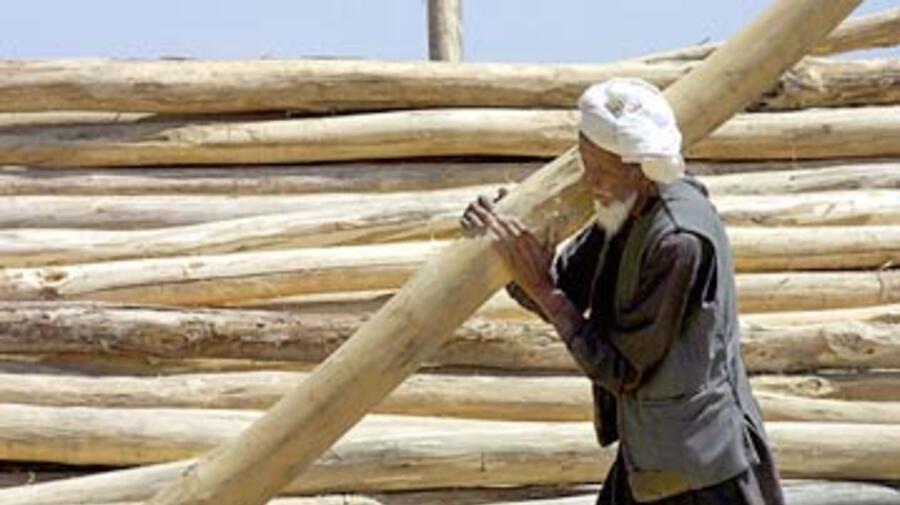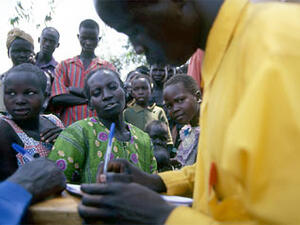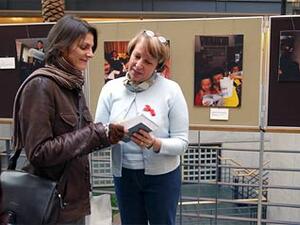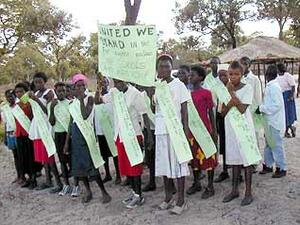Focus on sustainable returns for Afghans, urges Lubbers
Focus on sustainable returns for Afghans, urges Lubbers

An Afghan man collects wood beams to rebuild his house in the Taliban–destroyed town of Istalif in the Shomali Plain.
KABUL, Afghanistan, March 3 (UNHCR) - The head of the UN refugee agency, Ruud Lubbers, has called for a shift in focus from maximising the number of Afghan refugees returning home to ensuring that the repatriation is sustainable.
Lubbers, who left Afghanistan late Sunday, said "our planning number for 2003 is now 1.2 million, which is an enormous number but substantially less than the first year." In 2002, a total of more than 2 million Afghan refugees returned home, 1.8 million of them with assistance from UNHCR.
During 2003, Lubbers said, UNHCR was not looking at "maximising the numbers," but at a more gradual return movement, which should continue to be on a voluntary basis. "Voluntariness is the key," he said, requesting Iran and Pakistan "to be a bit patient." Noting that the numbers returning from the two neighbouring countries were, by any standard, extremely large, he said, "I think it's fair to ask them ... not to force people back, but to work with us on the gradual process of voluntary repatriation."
Acknowledging that the massive 2002 repatriation created problems in a country with devastated or non-existent infrastructure, he stressed that Afghanistan's capacity to welcome back its citizens had to be built up rapidly, with active participation by development and aid agencies.
In particular, more attention should be paid to the countryside, to prevent the cities from becoming "over-burdened" with rural returnees who are unable to sustain a livelihood in their home villages. "There are a lot of ruins, I'd say, both physically and in terms of the institutions," he said. Water supplies had to be ensured, jobs created, schools needed to be built, and education provided.
Nevertheless, while recognising the difficulties that still beset the country, and the risk that international attention may be diverted elsewhere, the High Commissioner was generally upbeat about the importance of continuing the repatriation process. "I'm convinced that we are on the right track and that the solution cannot be to track back, as it were, to keep the people outside and not promote this process."
Lubbers said the question of security was key, but that it was a fallacy to assume that there would be "a more secure Afghanistan by seeing less Afghans going home. No, it's the other way round. The process of repatriation is a peace-building process itself."
Some of the biggest security problems, impeding repatriation and even causing new displacements, have been in the northern regions of Afghanistan, where rivalries between local commanders and harassment of minorities, especially Pashtuns, have flared up periodically since the occupying Taliban forces were pushed out of the north in the autumn of 2001.
On February 28, Lubbers attended the first meeting of the northern Return Commission, at which key local leaders agreed to work on improving security in the north so that displaced Afghans, including around 60,000 people currently living in very difficult conditions in southern Afghanistan, will feel safe to return.
In order to get to the northern city of Mazar-i-Sharif, where the unprecedented meeting was due to take place, the High Commissioner opted for a 12-hour journey by road from Kabul, after bad weather rendered travel by air impossible two days in succession.
Together with the Afghan Minister of Repatriation, Enyatullah Nazari, Lubbers and other senior UNHCR officials battled their way by road across the Hindu Kush mountains to make it to the meeting. Despite blizzards and snowdrifts around the Salang Tunnel, the world's highest tunnel, and the need for armed guards along bandit-prone stretches of road further north, the party made it in time.
The Return Commission included the three biggest faction leaders in the north, General Abdul Rashid Dostum, General Ustad Atta Mohammad and Saradar Saeedi. The participants reviewed some of the key issues preventing people from returning, including land occupation, control of water supplies by local commanders, illegal taxation, forced recruitment, as well as the lack of jobs, shelter and other infrastructure.
At the end of the five-hour meeting of the Commission, the leaders agreed unanimously to improve security, prevent forcible recruitment and to take strong action against any local commanders who prevent people from returning to their homes in the northern provinces.
During the meeting, Lubbers stressed that if safety was guaranteed, more people would return and that this factor, together with increased security, would attract more reconstruction assistance, something he described as a "win-win situation."
Lubbers flew to Pakistan late Sunday on the second stage of his visit to the region - the fourth such visit in less than two years.






